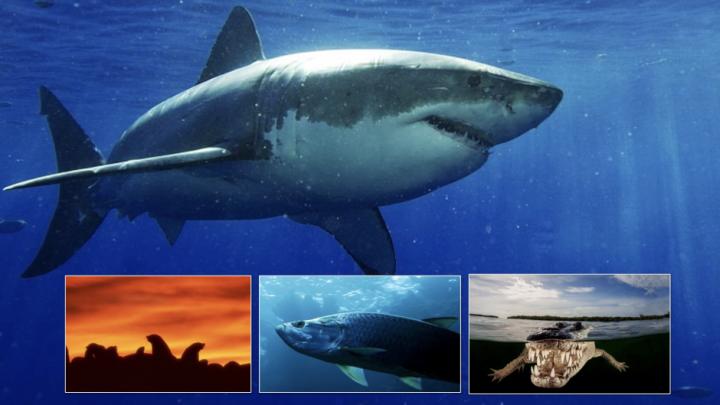
Credit: Shark, tarpon and cape fur seal: Neil Hammerschlag, Ph.D.
American Crocodile: Massimo Giorgetta
MIAMI–March 11, 2019– A new study from a team of leading scientists reports on the diverse ways that aquatic predators, such as sharks and alligators, can impact ecosystems and also benefit human society. The study shows how these important ecological processes and ecosystem services to society can break down or recover from population losses and recoveries of aquatic predators.
“Aquatic predators can influence their ecosystems by keeping prey populations in check, controlling the flow of nutrients, preventing the spread of diseases and invasive species, and even creating new habitats for other organisms,” said lead study author Neil Hammerschlag, a research associate professor at the University of Miami (UM) Rosenstiel School and Abess Center for Ecosystem Science & Policy. “In addition to benefiting humans as food, they are highly sought after for sport fishing, scuba diving and ecotourism, which creates thousands of jobs.”
The study also describes how aquatic predators can moderate climate change effects and have become inspiration for new products, such as shark skin-mimicking surfaces, being used to design more aerodynamic drones and planes, as well as the development of new medicines.
“To aid in future investigations, we identified 16 priority research questions.” said Steven Cooke, study co-author and professor at Carleton University, Canada. “One of the most critical is understanding how climate change is affecting the ecological roles of aquatic predators and the services they provide to humans in a changing world.”
The study concludes with a framework to aid policy makers and wildlife managers in supporting adaptive decision making involving aquatic predators within a context that maximizes their ecosystem function as well as the benefits they provide to humans under current and future environmental change.
###
The study, titled “Ecosystem Function and Services of Aquatic Predators in the Anthropocene”, DOI https:/
Organismic and Evolutionary Biology Program, University of Massachusetts, Rachel Skubel
Leonard and Jayne Abess Center for Ecosystem Science and Policy, University of Miami, Steven J. Cooke, Fish Ecology and Conservation Physiology Laboratory, Carleton University, Ottawa
About the University of Miami’s Rosenstiel School:
The University of Miami is one of the largest private research institutions in the southeastern United States. The University’s mission is to provide quality education, attract and retain outstanding students, support the faculty and their research, and build an endowment for University initiatives. Founded in the 1940’s, the Rosenstiel School of Marine & Atmospheric Science has grown into one of the world’s premier marine and atmospheric research institutions. Offering dynamic interdisciplinary academics, the Rosenstiel School is dedicated to helping communities to better understand the planet, participating in the establishment of environmental policies, and aiding in the improvement of society and quality of life. For more information, visit: http://www.
Media Contact
Diana Udel
[email protected]
Original Source
https:/
Related Journal Article
http://dx.




